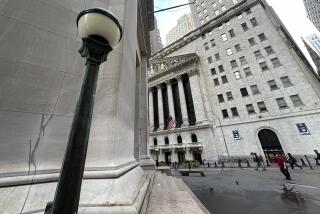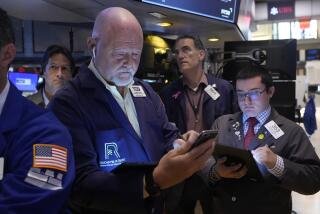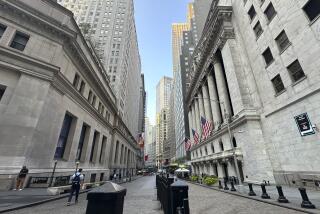Stocks Surge in 2nd Day of Rally
- Share via
Investors put away any lingering doubts about the recession’s end and pushed Enron Corp. worries far into the background Monday, as stock prices rocketed for a second straight session.
On the heels of last week’s surprisingly robust economic reports, the Dow Jones industrial average soared 217.96 points, or 2.1%, to 10,586.82, the highest close since July 19. The index leaped 262 points Friday.
The market’s gains Monday, in heavy trading, lifted other key indexes back into positive territory for the year to date, after a drubbing in January and February.
The Standard & Poor’s 500 index, up 2.3% on Friday, rose 2% on Monday, leaving it up 0.5% since year’s end. The Nasdaq composite gained 56.58 points, or 3.1%, to 1,859.32 on Monday, though it’s still down 4.7% this year.
As on Friday, stocks closed at or near their highs for the day, suggesting that big investors are rushing to put money to work.
Wall Street’s net two-day advance was its strongest since Sept.24-25, when prices rallied after diving in the week after the Sept. 11 terrorist attacks.
Though the Enron debacle has weighed heavily on the market this year, causing many investors to question the honesty of corporate accounting, “At the end of the day the main event is that we’re going to have an economic recovery,” said Jeffrey Applegate, investment strategist at brokerage Lehman Bros. in New York.
Fresh data Friday showed a dramatic turnaround in the manufacturing sector in February and continuing strength in consumer spending in January.
That information helped persuade Merrill Lynch & Co.’s chief economist, Bruce Steinberg, to raise his estimate Monday for U.S. economic growth this year.
“Demand is coming back far more quickly than anyone had expected,” Steinberg said.
In turn, that is boosting hopes that corporate profits, which had been expected to recover in the second half, may grow even faster than investors assumed.
Investors Monday were particularly hungry for shares of heavy-industry firms, in a bet that they may enjoy some of the largest percentage gains in earnings as demand for their products recovers.
The Dow was led higher by General Motors, up $3.73 to $58.70; machinery giant Caterpillar, up $2.75 to $59.08; and aluminum industry leader Alcoa, up $1.64 to $39.56. Airline stocks also were up sharply, as were financial issues and home builders.
Foreign stock markets rallied sharply as well. Japan’s Nikkei-225 index zoomed 638.22 points, or 5.9%, to 11,450.22.
Some stock buyers were doing so under duress: “Short sellers”--traders who borrow stock and sell it, betting on lower prices--have been under pressure to terminate those bets as the market has rocketed since Friday. As they buy shares to close out their positions, short sellers can help power a market advance.
But Monday’s rally was driven by more than short-covering, analysts said. Winners topped losers by about 2 to 1 on the New York Stock Exchange and on Nasdaq.
In the technology sector, some of the biggest winners of the last two sessions have been semiconductor stocks. That sector is viewed as a classic way to bet on a recovery in demand for computers and other tech equipment.
A notable loser Monday, though, was software giant Oracle. It plunged $2.32 to $13.67 after warning Friday that earnings in the quarter just ended won’t meet expectations. Oracle’s sell-off didn’t stop other tech shares from rallying, but analysts noted that tech indexes have significantly underperformed the heavy-industry and transportation sectors in recent weeks.
That points up a key issue for technology and the market overall: Stocks’ price-to-earnings ratios, on average, remain historically high--or at least, not cheap.
With many stocks priced at about 20 times estimated 2002 earnings per share--and with many tech shares selling for far higher P/Es--Applegate believes the market already is “reasonably close” to the high end of a fair valuation.
However, investors’ views of what’s “fair” for a stock’s price can change with their estimation of future earnings growth. Those views also depend on what alternative investments are paying.
Stocks now are attracting some investors by default: The average yield on taxable money-market mutual funds now is about 1.3%, a record low, thanks to the Federal Reserve’s drastic cuts in short-term interest rates over the last year.
“When you can only make 1.3% on your cash, it just burns a hole in your pocket,” said Frank Glaser, a Los Angeles retiree and investor.
Long-term Treasury bond yields also remain relatively low. The yield on the 10-year T-note edged up to 5% on Monday from 4.98% on Friday.
Just a few weeks ago, as the Enron scandal shook investors’ confidence in the financial system, Treasury bonds still had significant appeal for many. But the economy’s brightening outlook is demanding more investors’ attention, and shifting their focus back to stocks, analysts say.
The Enron blowup even has made some investors more optimistic, they say. Charlene Hyde, a Pacific Palisades speech pathologist, said the congressional scrutiny of companies’ accounting procedures is encouraging for the market.
“It’s a very positive thing that [lawmakers] are not letting them get away with it,” she said. “I think it bodes well for the future because it’s likely to make other companies a little more forthcoming.”
On Monday, trust in an economic recovery also outweighed any concerns over the renewed heavy fighting in Afghanistan. Robert Bissell, chief investment officer at Wells Capital Management in Los Angeles, said that although investors still have worries about the Afghanistan situation and the possibility of another major terrorist attack, “The difference now is that it looks like the momentum is on our side” in the war effort.
Market Roundup, C8-9
More to Read
Inside the business of entertainment
The Wide Shot brings you news, analysis and insights on everything from streaming wars to production — and what it all means for the future.
You may occasionally receive promotional content from the Los Angeles Times.










